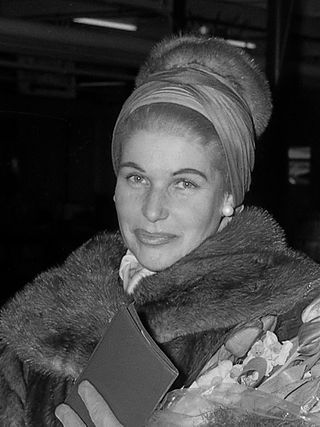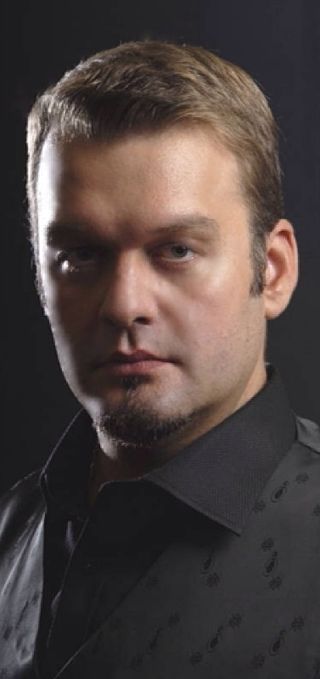Related Research Articles

Hilde Güden was an Austrian soprano who was one of the most appreciated Straussian and Mozartian sopranos of her day. Her youthful and lively interpretations made her an ideal interpreter of roles such as Zerbinetta in Ariadne auf Naxos and Susanna in Le nozze di Figaro.
Sir Thomas Boaz Allen is an English operatic baritone. He is widely admired in the opera world for his voice, the versatility of his repertoire, and his acting—leading many to regard him as one of the best lyric baritones of the late 20th century. In October 2011, he was appointed Chancellor of Durham University, succeeding Bill Bryson.

Eberhard Freiherr von Waechter was an Austrian lyric baritone celebrated for his performances in the operas of Mozart, Richard Wagner and Richard Strauss. After retiring from singing, he became intendant of the Vienna Volksoper and the Vienna State Opera.
Erich Kunz was an Austrian operatic baritone, particularly associated with the roles of Papageno and Beckmesser.
Wolfgang Brendel is a German opera singer (baritone), and a professor of voice at the Jacobs School of Music at Indiana University. He has performed throughout Europe, Asia, and North America.
Christian Boesch is an Austrian operatic baritone. He is the son of the soprano Ruthilde Boesch, and studied at the University of Music and Performing Arts Vienna, from 1959 to 1964. He was the pupil of Alfred Jerger, and made his official debut at the Stadttheater, Bern, in 1966. He joined the Vienna Volksoper in 1975.
Adrian Eröd is an Austrian operatic baritone. He is the son of composer Iván Erőd.

Sorin Coliban is a Romanian opera singer with an international career. His voice range is bass–baritone. He is known for the volume and projection of his voice, both of which help him to sing both bass and baritone roles. He is one of the few singers to have performed with two different voices in the same performance: bass-baritone and countertenor.
Benno Paul Kusche was a German operatic baritone, who was praised as one of the best Mozart and Wagner singers, especially in character roles and opera buffa.
Heinz Imdahl was a German operatic baritone. A member of the Bavarian State Opera, he performed many leading roles at the Vienna State Opera, and appeared as Beethoven's Pizarro at the Teatro dell'Opera di Roma and Wagner's Hans Sachs at the Philadelphia Opera.

Ernst Gutstein was an Austrian operatic baritone. He made an international career and also performed regularly at the Vienna State Opera. His repertoire included both tragic and comic characters, one of his signature roles being Faninal in Der Rosenkavalier by Richard Strauss. Gutstein created several roles in world premieres, such as Fortner's Perlimplin at the 1962 Schwetzingen Festival.

Hans Duhan was an Austrian operatic baritone. He belonged to the ensemble of the Vienna State Opera for 26 years and was the first Count Almaviva and the first Papageno of the Salzburg Festival.
Josef Hopferwieser was an Austrian operatic tenor.
Michael Volle is a German operatic baritone. After engagements at several German and Swiss opera houses, he has worked freelance since 2011. While he first appeared in Mozart roles such as Guglielmo, Papageno and Don Giovanni, he moved on to title roles such as Verdi's Falstaff, Tchaikovsky's Eugene Onegin and Alban Berg's Wozzeck. He has performed at major opera houses in Europe and the Metropolitan Opera, in roles including Mandryka in Arabella and Hans Sachs in Die Meistersinger von Nürnberg. His awards include Singer of the Year by Opernwelt and Der Faust.
Gottfried Hornik is an Austrian operatic baritone and voice teacher. He was a member of the Vienna State Opera for 25 years and appeared worldwide in leading roles. His signature role was Beckmesser in Wagner's Die Meistersinger von Nürnberg. He was awarded the title of an Austrian Kammersänger.
Sebastian Holecek is an Austrian operatic baritone. He has been part of the ensemble of the Vienna Volksoper since 2006.
Klemens Sander is an Austrian baritone.

Clemens Unterreiner is an Austrian operatic baritone. He is professionally active internationally as well as a soloist and ensemble member of the Vienna State Opera. His operatic repertoire ranges from lyric to German-Italian-French cavalier and heroic baritone roles to masses, oratorios and classical Lieder, and also includes operetta and modern music.

Paul Armin Edelmann is an Austrian operatic baritone. He received first musical training as a member of the Wiener Sängerknaben. After five years as an ensemble member at the Theater Koblenz, he has worked as a free-lance singer based in Vienna since 1997, appearing at major opera houses and festivals internationally, often together with his brother Peter Edelmann, also a baritone. Focused on Mozart roles such as Don Giovanni and Papageno, he also appeared at the Schwetzingen Festival in the world premiere of Salvatore Sciarrino's Luci mie traditrici.
Roman Sadnik is an Austrian operatic tenor.
References
- ↑ Michael Kraus Vita; in Karl J. Kutsch and Leo Riemens: Großes Sängerlexikon . Vierte, erweiterte und aktualisierte Auflage. Munich 2003. Vol. 4: Kainz–Menkes, p. 2497. ISBN 3-598-11598-9. Auszüge bei Google Books. Retrieved 15 July 2021
- 1 2 3 4 Michael Kraus Vita; Offizielle Internetpräsenz der Wiener Volksoper. Retrieved 15 July 2021
- ↑ Michael Kraus'performances at the Wiener Staasoper
- ↑ Michael H. Eisenblätter: MÄNNERSACHE. Performance review. In Orpheus . 5 May 1988 edition, p. 384.
- ↑ Michael KRAUS: „Ich hatte das Glück, berufen zu werden“ on Onlinemerker
- ↑ Michael Kraus on Bayerische Staatsoper
- ↑ "Michael Kraus: Deutsche Oper am Rhein Ensemble" . Retrieved 15 July 2021.